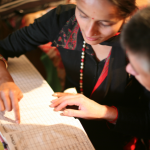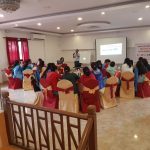Earlier this year a Fusion-funded series of public events at BU was organised by Professors Ann Brooks (FHSS), Candida Yates (FMC) and Barry Richards (FMC). For these ‘Dialogues in the Social Sciences’, leading social scientists were invited to speak at BU, along with other figures from outside and inside academia, on topics of current concern. The aim was to offer to BU students and staff, and to members of the local public, opportunities to hear and take part in authoritative and informed discussion of social and political issues.
The first was entitled ‘Increasing inequality? Widening opportunity? Debating higher education reform’ Two leading educationists from the University of London Institute of Education discussed the Higher Education Green Paper. Professor Sir Peter Scott (former editor of THE, and former V-C of Kingston University) and Professor Ann Phoenix, eminent psychosocial researcher, outlined their analysis of the prospects for the sector. BU’s Dr. Mastoureh Fathi (FHSS) and Ellie Mayo-Ward (SUBU V-P) were respondents. Chaired by Professor Iain MacRury of FMC, this event explored some of the risks to the sector in the current proposals.
In the second event (‘Our scandalised society’), criminologist Professor Chris Greer (City University) and Lord Blair (Sir Ian Blair, former Commissioner of the Met) discussed key issues regarding how the British state is responding to scandal proliferation, the implications of scandal for crime control and institutional regulation in the digital age, and the risk of scapegoating as a substitute for understanding and solving, particularly in a 24/7 news environment. Professor Ann Brooks was in the chair for an intriguing examination of the roles of both media and police in this complex intersection of social changes.
Professor Matthew Feldman of Teesside University is an expert on the Far Right; he was joined for the third and final event by Emman el-Badawy of the University of Exeter and the Centre on Religion and Geopolitics, and Dr Usama Hasan of the counter-radicalisation organisation the Quilliam Foundation, both experts on violent jihadism. Under the title of ‘Radicalisation: what is it and what threat does it pose?’, Professor Barry Richards chaired a wide-ranging discussion which both put the current threat of Islamist terror in broader historical contexts and looked closely at some of the debates around the Prevent counter-terrorism programme.
Each one of these events demonstrated that with excellent speakers and a thoughtful audience, a good discussion is guaranteed. All of them involved both students and members of the public, though the challenge of drawing in large numbers for early evening extra-curricular events was also in evidence. As well as their value to participants, these events flagged up internally and externally that BU has a growing base of social-scientific expertise, networked with internationally leading experts and pursuing a clear public engagement mission.
 New research ethics paper Faculty of Health & Social Sciences
New research ethics paper Faculty of Health & Social Sciences










 Up2U: New BU academic publication
Up2U: New BU academic publication New BU midwifery paper
New BU midwifery paper BU academic publishes in online newspaper in Nepal
BU academic publishes in online newspaper in Nepal Final day of the ESRC Festival of Social Science
Final day of the ESRC Festival of Social Science Using Art to enhance Research
Using Art to enhance Research ECR Funding Open Call: Research Culture & Community Grant – Application Deadline Friday 12 December
ECR Funding Open Call: Research Culture & Community Grant – Application Deadline Friday 12 December MSCA Postdoctoral Fellowships 2025 Call
MSCA Postdoctoral Fellowships 2025 Call ERC Advanced Grant 2025 Webinar
ERC Advanced Grant 2025 Webinar Horizon Europe Work Programme 2025 Published
Horizon Europe Work Programme 2025 Published Horizon Europe 2025 Work Programme pre-Published
Horizon Europe 2025 Work Programme pre-Published Update on UKRO services
Update on UKRO services European research project exploring use of ‘virtual twins’ to better manage metabolic associated fatty liver disease
European research project exploring use of ‘virtual twins’ to better manage metabolic associated fatty liver disease